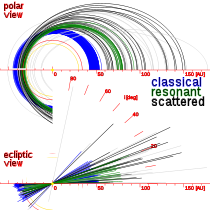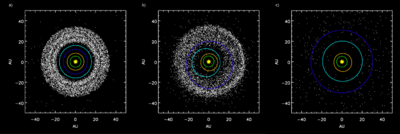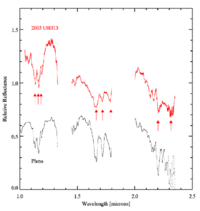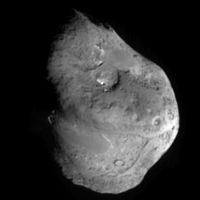
Scattered disc
Background to the schools Wikipedia
SOS believes education gives a better chance in life to children in the developing world too. To compare sponsorship charities this is the best sponsorship link.
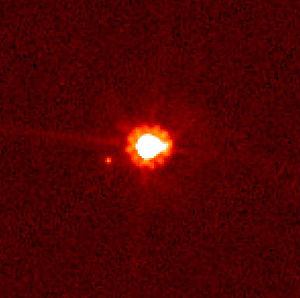
|
| ‡ Trans-Neptunian dwarf planets are called " plutoids" |
The scattered disc (or scattered disk) is a distant region of the Solar System that is sparsely populated by icy minor planets, a subset of the broader family of trans-Neptunian objects. The scattered-disc objects (SDOs) have orbital eccentricities ranging as high as 0.8, inclinations as high as 40°, and perihelia greater than 30 astronomical units (4.5×109 km; 2.8×109 mi). These extreme orbits are believed to be the result of gravitational "scattering" by the gas giants, and the objects continue to be subject to perturbation by the planet Neptune. While the nearest distance to the Sun approached by scattered objects is about 30–35 AU, their orbits can extend well beyond 100 AU. This makes scattered objects "among the most distant and cold objects in the Solar System". The innermost portion of the scattered disc overlaps with a torus-shaped region of orbiting objects traditionally called the Kuiper belt, but its outer limits reach much farther away from the Sun and farther above and below the ecliptic than the belt proper.
Because of its unstable nature, astronomers now consider the scattered disc to be the place of origin for most periodic comets observed in the Solar System, with the centaurs, a population of icy bodies between Jupiter and Neptune, being the intermediate stage in an object's migration from the disc to the inner Solar System. Eventually, perturbations from the giant planets send such objects towards the Sun, transforming them into periodic comets. Many Oort-cloud objects are also believed to have originated in the scattered disc.
Discovery
During the 1980s, the introduction of the charge-coupled device in telescopes in combination with higher-capacity computers for image analysis allowed for more efficient deep-sky surveys than was practical using photography. This led to a flood of new discoveries: between 1992 and 2006, over a thousand trans-Neptunian objects were detected.
The first scattered-disc object to be recognised as such was 1996 TL66, originally identified in 1996 by astronomers based at Mauna Kea in Hawaii. Three more were identified by the same survey in 1999: 1999 CV118, 1999 CY118, and 1999 CF119. The first object presently classified as an SDO to be discovered was 1995 TL8, found in 1995 by Spacewatch.
As of 2011, over 200 SDOs have been identified, including 2007 UK126 (discovered by Schwamb, Brown, and Rabinowitz), 2002 TC302 ( NEAT), Eris (Brown, Trujillo, and Rabinowitz), Sedna (Brown, Trujillo, and Rabinowitz) and 2004 VN112 ( Deep Ecliptic Survey). Although the numbers of objects in the Kuiper belt and the scattered disc are hypothesized to be roughly equal, observational bias due to their greater distance means that far fewer SDOs have been observed to date.
Subdivisions of trans-Neptunian space
Known trans-Neptunian objects are often divided into two subpopulations: the Kuiper belt and the scattered disc. A third reservoir of trans-Neptunian objects, the Oort cloud, is believed to exist, although no confirmed direct observations of the Oort cloud have been made. Some researchers further suggest a transitional space between the scattered disc and the inner Oort cloud, populated with " detached objects".
Scattered disc versus Kuiper belt
The Kuiper belt is a relatively thick torus (or "doughnut") of space, extending from about 30 to 50 AU comprising two main populations of Kuiper belt objects (KBOs): the classical Kuiper-belt objects (or "cubewanos"), which lie in orbits untouched by Neptune, and the resonant Kuiper-belt objects; those which Neptune has locked into a precise orbital ratio such as 3:2 (the object goes around twice for every three Neptune orbits) and 2:1 (the object goes around once for every two Neptune orbits). These ratios, called orbital resonances, allow KBOs to persist in regions which Neptune's gravitational influence would otherwise have cleared out over the age of the Solar System, since the objects are never close enough to Neptune to be scattered by its gravity. Those in 3:2 resonances are known as " plutinos", because Pluto is the largest member of their group, whereas those in 2:1 resonances are known as " twotinos".
In contrast to the Kuiper belt, the scattered-disc population can be disturbed by Neptune. Scattered-disc objects come within gravitational range of Neptune at their closest approaches (~30 AU) but their farthest distances reach many times that. Ongoing research suggests that the centaurs, a class of icy planetoids that orbit between Jupiter and Neptune, may simply be SDOs thrown into the inner reaches of the Solar System by Neptune, making them "cis-Neptunian" rather than trans-Neptunian scattered objects. Some objects, like (29981) 1999 TD10, blur the distinction and the Minor Planet Centre (MPC), which officially catalogues all trans-Neptunian objects, now lists centaurs and SDOs together.
The MPC also makes a clear distinction between the Kuiper belt and the scattered disc; separating those objects in stable orbits (the Kuiper belt) from those in scattered orbits (the scattered disc and the centaurs). However, the difference between the Kuiper belt and the scattered disc is not clearcut, and many astronomers see the scattered disc not as a separate population but as an outward region of the Kuiper belt. Another term used is "scattered Kuiper-belt object" (or SKBO) for bodies of the scattered disc.
Morbidelli and Brown propose that the difference between objects in the Kuiper-belt and scattered-disc objects is that the latter bodies "are transported in semi-major axis by close and distant encounters with Neptune", but the former experienced no such close encounters. This delineation is inadequate (as they note) over the age of the Solar System, since bodies "trapped in resonances" could "pass from a scattering phase to a non-scattering phase (and vice versa) numerous times". That is, trans-Neptunian objects could travel back and forth between the Kuiper belt and the scattered disc over time. Therefore they chose instead to define the regions, rather than the objects, defining the scattered disc as "the region of orbital space that can be visited by bodies that have encountered Neptune" within the radius of a Hill sphere, and the Kuiper belt as its "complement ... in the a > 30 AU region"; the region of the Solar System populated by objects with semi-major axes greater than 30 AU.
Detached objects
The Minor Planet Centre classifies the trans-Neptunian object 90377 Sedna as a scattered-disc object. Its discoverer Michael E. Brown has suggested instead that it should be considered an inner Oort-cloud object rather than a member of the scattered disc, because, with a perihelion distance of 76 AU, it is too remote to be affected by the gravitational attraction of the outer planets. Under this definition, an object with a perihelion greater than 40 AU could be classified as outside the scattered disc.
Sedna is not the only such object: 2000 CR105 (discovered before Sedna) and 2004 VN112 have a perihelion too far away from Neptune to be influenced by it. This led to a discussion among astronomers about a new minor planet set, called the extended scattered disc (E-SDO). 2000 CR105 may also be an inner Oort-cloud object or (more likely) a transitional object between the scattered disc and the inner Oort cloud. More recently, these objects have been referred to as "detached", or distant detached objects (DDO).
There are no clear boundaries between the scattered and detached regions. Gomes et al. define SDOs as having "highly eccentric orbits, perihelia beyond Neptune, and semi-major axes beyond the 1:2 resonance." By this definition, all distant detached objects are SDOs. Since detached objects' orbits cannot be produced by Neptune scattering, alternative scattering mechanisms have been put forward, including a passing star or a distant, planet-sized object.
A scheme introduced by a 2005 report from the Deep Ecliptic Survey by J. L. Elliott et al. distinguishes between two categories: scattered-near (i.e. typical SDOs) and scattered-extended (i.e. detached objects). Scattered-near objects are those whose orbits are non-resonant, non-planetary-orbit-crossing and have a Tisserand parameter (relative to Neptune) less than 3. Scattered-extended objects have a Tisserand parameter (relative to Neptune) greater than 3 and have a time-averaged eccentricity greater than 0.2.
An alternative classification, introduced by B. Gladman, B. Marsden and C. VanLaerhoven in 2007, uses 10-million-year orbit integration instead of the Tisserand parameter. An object qualifies as an SDO if its orbit is not resonant, has a semi-major axis no greater than 2000 AU, and, during the integration, its semi-major axis shows an excursion of 1.5 AU or more. Gladman et al. suggest the term scattering disk object to emphasize this present mobility. If the object is not an SDO as per the above definition, but the eccentricity of its orbit is greater than 0.240, it is classified as a detached TNO. (Objects with smaller eccentricity are considered classical.) In this scheme, the disc extends from the orbit of Neptune to 2000 AU, the region referred to as the inner Oort cloud.
Orbits
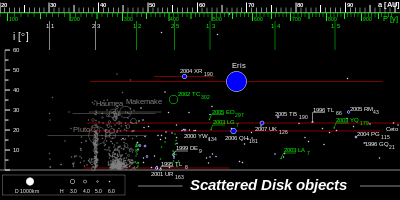
The scattered disc is a very dynamic environment. Because they are still capable of being perturbed by Neptune, SDOs' orbits are always in danger of disruption; either of being sent outward to the Oort cloud or inward into the centaur population and ultimately the Jupiter family of comets. For this reason Gladman et al. prefer to refer to the region as the scattering disc, rather than scattered. Unlike Kuiper-belt objects (KBOs), the orbits of scattered-disc objects can be inclined as much as 40° from the ecliptic.
SDOs are typically characterized by orbits with medium and high eccentricities with a semi-major axis greater than 50 AU, but their perihelia bring them within influence of Neptune. Having a perihelion of roughly 30 AU is one of the defining characteristics of scattered objects, as it allows Neptune to exert its gravitational influence.
The classical objects ( cubewanos) are very different from the scattered objects: more than 30% of all cubewanos are on low-inclination, near-circular orbits whose eccentricities peak at 0.25. Classical objects possess eccentricities ranging from 0.2 to 0.8. Though the inclinations of scattered objects are similar to the more extreme KBOs, very few scattered objects have orbits as close to the ecliptic as much of the KBO population.
Although motions in the scattered disc are random, they do tend to follow similar directions, which means that SDOs can become trapped in temporary resonances with Neptune. Examples of resonant orbits within the scattered disc include 1:3, 2:7, 3:11, 5:22 and 4:79.
Formation
The scattered disc is still poorly understood: no model of the formation of the Kuiper belt and the scattered disc has yet been proposed that explains all their observed properties.
According to contemporary models, the scattered disc formed when Kuiper belt objects (KBOs) were "scattered" into eccentric and inclined orbits by gravitational interaction with Neptune and the other outer planets. The amount of time for this process to occur remains uncertain. One hypothesis estimates a period equal to the entire age of the Solar System; a second posits that the scattering took place relatively quickly, during Neptune's early migration epoch.
Models for a continuous formation throughout the age of the Solar System illustrate that at weak resonances within the Kuiper belt (such as 5:7 or 8:1), or at the boundaries of stronger resonances, objects can develop weak orbital instabilities over millions of years. The 4:7 resonance in particular has large instability. KBOs can also be shifted into unstable orbits by close passage of massive objects, or through collisions. Over time, the scattered disc would gradually form from these isolated events.
Computer simulations have also suggested a more rapid and earlier formation for the scattered disc. Modern theories indicate that neither Uranus nor Neptune could have formed in situ beyond Saturn, as too little primordial matter existed at that range to produce objects of such high mass. Instead, these planets, and Saturn, may have formed closer to Jupiter, but were flung outwards during the early evolution of the Solar System, perhaps through exchanges of angular momentum with scattered objects. Once the orbits of Jupiter and Saturn shifted to a 2:1 resonance (two Jupiter orbits for each orbit of Saturn), their combined gravitational pull disrupted the orbits of Uranus and Neptune, sending Neptune into the temporary "chaos" of the proto-Kuiper belt. As Neptune traveled outward, it scattered many trans-Neptunian objects into higher and more eccentric orbits. This model states that 90% or more of the objects in the scattered disc may have been "promoted into these eccentric orbits by Neptune's resonances during the migration epoch...[therefore] the scattered disc might not be so scattered."
Composition
Scattered objects, like other trans-Neptunian objects, have low densities and are composed largely of frozen volatiles such as water and methane. Spectral analysis of selected Kuiper belt and scattered objects has revealed signatures of similar compounds. Both Pluto and Eris, for instance, show signatures for methane.
Astronomers originally supposed that the entire trans-Neptunian population would show a similar red surface colour, as they were believed to have originated in the same region and subjected to the same physical processes. Specifically, SDOs were expected to have large amounts of surface methane, chemically altered into complex organic molecules by energy from the Sun. This would absorb blue light, creating a reddish hue. Most classical objects display this colour, but scattered objects do not; instead, they present a white or greyish appearance.
One explanation is the exposure of whiter subsurface layers by impacts; another is that the scattered objects' greater distance from the Sun creates a composition gradient, analogous to the composition gradient of the terrestrial and gas giant planets. Mike Brown, discoverer of the scattered object Eris, suggests that its paler colour could be because, at its current distance from the Sun, its atmosphere of methane is frozen over its entire surface, creating an inches-thick layer of bright white ice. Pluto, conversely, being closer to the Sun, would be warm enough that methane would freeze only onto cooler, high-albedo regions, leaving low-albedo tholin-covered regions bare of ice.
Comets
The Kuiper belt was initially believed to be the source of the Solar System's ecliptic comets. However, studies of the region since 1992 have revealed that the orbits within the Kuiper belt are relatively stable, and that these comets originate from the more dynamic scattered disc.
Comets can loosely be divided into two categories: short-period and long-period—the latter being believed to originate in the Oort cloud. There are two major categories of short-period comets: Jupiter-family comets and Halley-family comets. The latter group, which is named for its prototype, Halley's Comet, are believed to have emerged from the Oort cloud but to have been drawn into the inner Solar System by the gravity of the giant planets. The former type, the Jupiter family, are believed to have originated from the scattered disc. The centaurs are thought to be a dynamically intermediate stage between the scattered disc and the Jupiter family.
There are many differences between SDOs and Jupiter-family comets, even though many of the latter may have originated in the scattered disc. Although the centaurs share a reddish or neutral coloration with many SDOs, their nuclei are bluer, indicating a fundamental chemical or physical difference. One hypothesis is that comet nuclei are resurfaced as they approach the Sun by subsurface materials which subsequently bury the older material.
